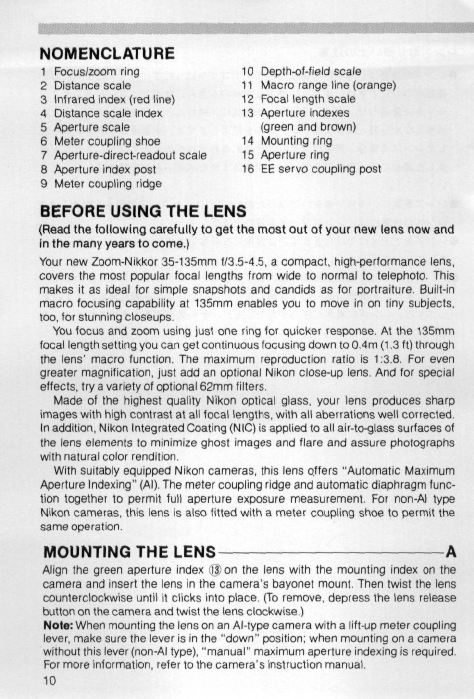
NOMENCLATURE
1 Focus/zoom ring 10 Depth-of-field scale
2 Distance scale 11 Macro range line (orange)
3 Infrared index (red line) 12 Focal length scale
4 Distance scale index 13 Aperture indexes
5 Aperture scale (green and brown)
6 Meter coupling shoe 14 Mounting ring
7 Aperture-direct-readout scale 15 Aperture ring
8 Aperture index post 16 EE servo coupling post
9 Meter coupling ridge
BEFORE USING THE LENS
(Read the following carefully to get the most out of your new lens now and
in the many years to come.)
Your new Zoom-Nikkor 35-135mm f/3.5-4,5, a compact, high-performance lens,
covers the most popular focal lengths from wide to normal to telephoto. This
makes it as ideal for simple snapshots and candids as for portraiture. Built-in
macro focusing capability at 135mm enables you to move in on tiny subjects,
too,
for stunning closeups.
You focus and zoom using just one ring for quicker response. At the 135mm
focal length setting you can get continuous focusing down to 0.4m (1,3 ft) through
the lens' macro function. The maximum reproduction ratio is
1:3.8.
For even
greater magnification, just add an optional Nikon close-up lens. And for special
effects, try
a
variety of optional 62mm filters.
Made of the highest quality Nikon optical glass, your lens produces sharp
images with high contrast at all focal lengths, with ail aberrations well corrected.
In addition, Nikon Integrated Coating (NIC) is applied to all air-to-glass surfaces of
the lens elements to minimize ghost images and flare and assure photographs
with natural color rendition.
With suitably equipped Nikon cameras, this lens offers "Automatic Maximum
Aperture Indexing" (Al)- The meter coupling ridge and automatic diaphragm func-
tion togelher to permit full aperture exposure measurement. For non-AI type
Nikon cameras, this lens is also fitted with a meter coupling shoe to permit the
same operation.
MOUNTING THE LENS A
Align the green aperture index @on the lens with the mounting index on the
camera and insert the lens in the camera's bayonet mount. Then twist the lens
counterclockwise until it clicks into place. (To remove, depress the lens release
button on the camera and twist the lens clockwise.)
Note:
When mounting the lens on an Al-type camera with a lift-up meter coupling
lever, make sure the lever is in the "down" position; when mounting on a camera
without this lever
(non-AI
type), "manual" maximum aperture indexing is required.
For more information, refer to the camera's instruction manual.
10


















